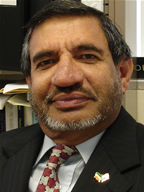Three Times a Winner
Electrical Engineering Professor Among 50 Worldwide to Watch in Field of Satellite Navigation
June 5, 2007
By Russ Hudson
It’s a little like winning the office pool on the Stanley Cup Finals, then going home to find an unexpected tax rebate, too. And both of those just a few months after winning a trophy.
Mohinder Grewal, professor of electrical engineering, has been named one of the “50+ Leaders to Watch” in 2007 and 2008 for advancements in space-based positioning, navigation and timing systems in the online May issue of GPS World.
“As the year continues to unfold, look for these individuals, as well as their companies and organizations, to bring further innovation to an already dynamic field,” reads the introduction to “50+ Leaders to Watch.”
“I feel very good about this,” said Grewal. “It is an exclusive group, and they are from around the world. I know most of them and am aware of the work of all of them.”
The professor said he expects to see most of them Sept. 25-28 in Fort Worth, Texas, during the Institute of Navigation Conference on Global Navigation Satellite Systems (GNSS). “I will be giving a tutorial on WAAS — that is Wide Area Augmentation System — at the conference.”
WAAS is another of the three “wins” Grewal has had lately. In April, he was informed that Raytheon has submitted to the U.S. Patent Office Grewal’s mathematical algorithm to improve navigation via WAAS. The full title is “Method and Apparatus for Wide Area Augmentation System Having Geo Uplink Subsystem With Enhanced Clock Steering.”
Although the process is still under way, Grewal expects to get the patent. He speaks from experience, since he acquired a patent for similar work on satellite navigation systems. That one refined and improved calculating time differentials between when the satellite sees a moving object, such as an aircraft, and when the data gets back to the aircraft to tell it exactly where it is.
The new algorithm does something similar.
“It corrects the signal being sent. There can be errors in the data given by the Global Positioning Satellites. They orbit the Earth and, therefore, are in motion, which can introduce errors — as can the time difference between when the data is sent and when it gets back to the target. Atmospheric interference and ionization from the sun’s radiation can introduce errors, too, that need to be corrected,” Grewal said.
“That data gets sent to a ground station for calculations, then is sent back up to a geostationary satellite — which does not orbit, but stays over the same part of the Earth all the time — then back to the aircraft, automobile or ship,” said the engineer. “The new algorithm further refines correcting for those errors, including the time differential, which is called steering the clock. The clock is steered to within a nanosecond.
“You just can’t have a 10-meter error when an airplane is landing,” he said.
In January, the first of Grewal’s “wins” was the second edition of his book on global positioning and inertial navigation systems, “Global Positioning Systems, Inertial Navigation and Integration,” published by Wiley & Sons. Co-authors are Lawrence R. Weill, emeritus professor of mathematics, and Angus P. Andrews, a retired senior scientist for Rockwell.
The book, a guide to Global Navigation Satellite and Inertial Navigation systems and the integration of the two, includes a CD and solutions to real-world Global Positioning Systems (GPS) problems. Besides aircraft and automobile navigation, it is used in cell phones, national security, commercial fishing and geocaching — even golf.
The first edition of “Global Positioning, Systems, Inertial Navigation and Integration,” was published in 2001, the same year as the second edition of Grewal’s “Kalman Filtering: Theory and Practice Using MATLAB,” also published by John Wiley & Sons. He is working on the third edition now, with an anticipated release date in early 2008.
Kalman filtering is an integral part of GPS technology, so his books are complementary, he said.
Grewal earned his doctorate at USC and joined the Cal State Fullerton faculty in 1975.

